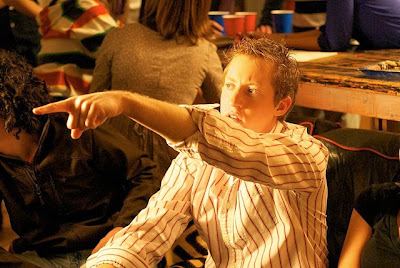This week we continue the topic of filmmaking with a feature editorial by Paul Horsfield. Paul is an experienced actor, who's seen the process of making films in and out, and many times over. In this feature he points out what he sees as the top ten issues to consider when shooting your first film. So without further ado, here are the ten First Film Fundamentals.
10 First Film Fundamentals
2. Place a casting call. Acting is totally different from what most people think. So you really need trained actors, people who know what they’re doing. Ok, you can ask your mates to help on your first film, but you’ll get a better product with pros. And the good news is many of them will do it for nothing (apart from coffee and maybe a biscuit). Look on the screen casting web sites, such as Casting Call Pro. If you put up a call for ‘male, 21-25’, be prepared for hundreds of responses.
3. You really need a director. And... there must only be ONE of these! This is incredibly important to understand. He is the only person telling people (actors, crew) what to do. It's his film. The planning should be such that he knows exactly what's going on and what's next. He has the shooting schedule and is trying to stick to it. If you have a committee, it’ll take you much longer and the quality will be low. And who’s film is it then? If anyone has an idea during the shoot, great. For example, they think an actor’s response should be different, great. Tell the director. Don’t tell the actor.
4. Stick to the schedule. It may not always possible to stick to the schedule, but you should be close. You need to make it slick and efficient. Everyone must know when a scene is shooting and when it's finished. The usual procedure is for the director to set things up and make sure everyone's ready. To start a scene, the director asks if everyone is ready:
- Camera
- Sound
- The actors
Then, he says ‘action’. When it’s done, he says ‘cut’. If he’s happy, he tells everyone it’s ok, then it’s on to the next scene. It sounds formal, but it’s evolved over the years because it’s efficient.
5. Stick to the timing. It might not seem so if you’re just messing about on your first film, but if you get into filming, you’ll find if things don’t happen when they should, you’ll get frustrated and a 10-min film will take you a month to make! Ensure that all your actors and crew arrive on time and be ready to go. If they don’t, don’t use them again.
6. Be flexible. People have new ideas all the time, some of them good ones. People are, or should be, experts, so the director needs to listen to the sound guy when he says he can hear a bird tweeting 2 miles away, the actors when they want to talk or move in certain ways or alter the script slightly, etc. However, they tell the director; he’s the boss. It's always his decision.
 |
| You need to be flexible. Literally. |
7. Practice the Golden Rule. What might surprise you is how tiring filming can be for everyone involved. Often, the director is on an adrenalin high and tends not to notice, so he needs to remember this. So there is a Golden Rule for everyone, especially the director: Treat people well! At the end of an 8-hour day, everyone is tired and wants to go home or to a pub. Frustrations can build. If everyone is nice, people want to carry on working and will give their best. So, be nice. Have breaks. Oh, and always let people go to the toilet whenever they ask.
8. Supply the crew. As a minimum, coffee, or other tasty beverage. Ideally, one when people arrive and another one mid-morning. The actors need this and expect it. Remember, they’re giving their hard-earned skill for nothing. You get an actor, the actor gets experience and another notch on the CV. A cuppa is a small price to pay for a good performance.
 |
| Everybody likes a full stomach. Full stop. |
9. Shared goal, shared responsibility. There’s one thing that would make it all so much easier. You can’t ask people to do it, but it comes about when people are treated well and respected for doing their bit. The best shoots happen when people don’t think: ‘I’m acting, she’s doing the camera, he’s doing the sound, she’s directing, he’s doing make-up, she’s going for the tea...’, but instead they think: Together, we are all trying to create one thing. When people think in this way, the actor is happy to carry the sound equipment, the sound guy will help change lenses, the make-up girl becomes an extra in a scene, and so on. Work together on the common goal.
10. Enjoy it! For all its frustrations, the slowness, the weather, the tiredness, the general ‘this is not going how I pictured it in my head’ feeling, filming is fun. Enjoy it. And you never know who’s going to see it, so do the best you can.
Paul Horsfield is a character actor, based in London, UK. He has acted in three feature films and numerous TV pilots and short films. www.paulhorsfield.co.uk



No comments:
Post a Comment